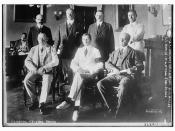ìTennessee Williamsî Many great and noted playwrights influence theater. Each of their individual styles and views create many new plays and productions. Often times, a playwright will unknowingly allow his or her life bleed into the piece of work and begin to tell of his or her lifeÃÂs experiences through the different characters. Tennessee Williams was not an exception to the practice of writing about his familial problems and experiences. In fact, The Glass Menagerie is written almost parallel to his life.
Tennessee Williams was born Thomas Lanier Williams, the second child of three, in Columbus, Mississippi on March 26, 1911. Tom, as he known for most of his life, earned the nickname from a college roommate who attributed the name, jokingly to Williamsàheritage as a Tennessee pioneer. Tennessee Williams family life was full of tension and despair. His parents often engaged in violent arguments that frightened his older sister, Rose, so much that one evening she even went running out of the house (ìTennessee Williamsî http://www.hipp.gator.net/scarplaywright.html).
His father, Cornelius, who was a stern businessman from a prominent Tennessee family was the manager of a shoe warehouse, and had serious problems with drinking and gambling-habits that later ailed him. Tennessee hated his father with a passionate loathing. Coffin Williams was an emotional terrorist who called his son Tom names like ìMiss Nancyî and ìsissyî, and who allegedly abused Rose (ìTennessee Williamsî http://channel.cyberiacafe.net/episodes/webstage/episode2/back1.html). His mother, Edwina, a southern belle and the daughter of a clergyman is frequently used as the inspiration for the domineering and possessive motherÃÂs in his plays. Edwina, who is often compared to the controlling Amanda in The Glass Menagerie, allowed RoseÃÂs doctor to perform a frontal lobotomy on Rose leaving her crippled for the rest of her life (ìTennessee Williamsî Encarta 99 CD ROM). Rose was in an institution for most of her life for her schizophrenia (ìTennessee Williamsî DICSovering Authors Gale Research Inc., 1993). In 1931, Williams was admitted to the University of Missouri where he saw a production of IbsenÃÂs Ghosts and decided to become a playwright. His journalism program, however, was interupted when his father forced him to withdraw from college and work at the International Shoe Company. Williams reenrolled in college at Washington University only to be dropped in 1937. Finally, in 1938, Williams graduated form the University of Iowa. At that time, he had already produced several plays locally (ìTennessee Williamsî ComptonÃÂs Encyclopedia 99 CD ROM) TennesseeÃÂs primary sources of inspiration for his works were the writers he grew up with, his family, and the South. He was noted by many for bringing his audiences a slice of his own life and the feel of southern culture. Elia Kazan said of Tennessee: ìEverything in his life is in his plays, and everything in his plays is in his lifeî (ìTennessee Williamsî http://www.hipp.gator.net/scarplaywright.html). Williams once told an interviewer, ìMy work is emotionally autobiographicalî (ìTennessee Williamsî DISCovering Authors, Gale Research Inc., 1993). Of all of Tennessee Williamsàplays, The Glass Menagerie is the most autobiographical In 1944, Williams captured the publicÃÂs attention with his first major play, The Glass Menagerie. Tom, the narrator of the play, dreams of being a writer and is said to represent Williams. TomÃÂs sister, Laura, is crippled both physically and socially much like his sister Rose. TomÃÂs mother, Amanda, is a fading southern belle who lives in the past. The absence of a father in the play is a touching naÃÂve evasion of perhaps the most difficult family relationship for Williams to reconcile (ìTennessee Williamsî http://channel.cyberiacafe.net/episodes/webstage/episode2/back1.html). The action of the play concerns Amanda persuading Tom to bring a ìgentleman caller,î whom she hopes will marry Laura and provide for her future. Tom brings a man who is already engaged, upsetting his mother and causing Laura to retreat more deeply into her fantasy world of records and her glass animal collection. Tom, then, leaves the family, as his father had before him, to pursue his own destiny. The simplicity of the plot is full of lyrical language and profound symbolism, which some critics consider overwhelming. However, this emotionally compelling play was extremely popular, and Williams followed its formula in his later work. Laura is the typical Williams heroine in that she is too fragile to live in the real world (ìTennessee Williamsî Encarta 99 CD ROM). LauraÃÂs and AmandaÃÂs escapes from the world through fantasy and living in the past, respectively, foreshadow later plays where the characters escape through alcohol and sex-which Tennessee and his father both did.
The Glass Menagerie is believed to be by many as the autobiography of Williamsàlife. WilliamÃÂs younger brother Dakin was not alone in recognizing their mother in Amanda Wingfield: her traditions, obsessions, and ideas were faithfully transferred to the stage. Williamsàmother like Amanda was a fading southern belle who more or less raising her children alone because his father was a traveling salesman for a big portion of his life. She successfully raised Tennessee to be a fine young man and a hard worker. However, since Rose was physically and mentally handicapped like Laura, TennesseeÃÂs mother worked hard caring for her and trying to find her a young man to marry (ìTennessee Williamsî http://www.etsu.deu/haleyd/twbio.html). Tom, in The Glass Menagerie, is actually portraying TennesseeÃÂs thoughts, actions, and feelings. He is a young man working in a factory hoping to make it one day as a writer. Laura is TennesseeÃÂs character for Rose. They are both handicapped physically, socially, and psychologically. Their mothers control their lives and hope to find a man to take care of them in the future. Rose, much like Laura, had a wild imagination and an inexhaustible spirit.
Tennessee expressed many of the same themes in all of his plays. The ones that he was known for using are as follows: loss and sadness of day-to-day life, outsiders struggling in the world, moral ambiguity, yearning for relief or happiness in a gloomy world, fear of death and of dying, and being a dreamer (ìTennessee Williamsî http://www.kidsnetconnect.com/knc3new/html/Education.html). Many of the themes that Tennessee used are many of the problems that he suffered from. Tennessee was a depressed man and struggled in the world. He suffered of moral ambiguity and was constantly looking for relief in all of the wrong places such as sex, drugs, alcohol, and even homosexuality. Many critics blame these problems on his rough childhood, his over critical father, and because of his closeness to Rose.
Unfortunately, Williams died tragically on February 23 of 1983. He choked to death on the plastic top to his eye medication, which he possibly mistook for a sleeping pill (ìTennessee Williamsî http://www.hipp.gator.net/scarplaywright/html). He left behind a series of successful plays and screen adaptations.
As one can see, Tennessee Williams simply wrote of the tragedy in his own life, which was the nightmare in other peopleÃÂs lives. He was looking for a sense of completeness and familial support. The Glass Menagerie is not just a great play, but an in-depth look at Tennessee WilliamsÃÂ life and his experiences.

![[New York City Mayor William J.] Gaynor reviewing parade (LOC)](https://s.writework.com/uploads/3/32760/new-york-city-mayor-william-j-gaynor-reviewing-parade-loc-thumb.jpg)



